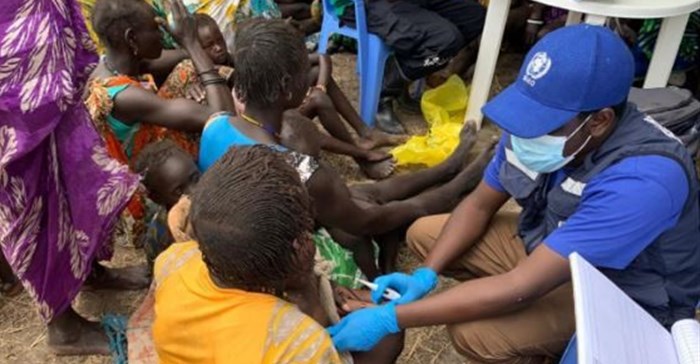Three multilateral development banks, in collaboration with the World Health Organization (WHO), have introduced the Health Impact Investment Platform.

Source: @WHOSouthSudan
This initiative aims to enhance and support vital primary healthcare services, focusing on climate and crisis resilience in low- and middle-income countries.
The platform, launched during the summit for a New Global Financing Pact being held in Paris, will make an initial €1.5bn (R30.5bn) available to low- and low-and-middle income countries in concessional loans and grants to expand the reach and scope of their primary healthcare services, especially for the most vulnerable and underserved populations and communities.
The African Development Bank, European Investment Bank (EIB), Islamic Development Bank (IsDB) and WHO are the platform’s founding members. As this is a global challenge, the Inter-American Development Bank (IDB) is also considering joining this partnership in view to extending this initiative to the Latin America and the Caribbean region.
WHO will act as the platform’s policy co-ordinator, responsible for ensuring alignment of financing decisions with national health priorities and strategies. The platform’s secretariat will support governments to develop national health and prioritise primary health care investment plans. The platform will also aim to catalyse wider primary healthcare investments in support of government health strategies.
Tedros Adhanom Ghebreyesus, WHO director-general, said a primary healthcare, or PHC, approach offers the most effective means to improve health and wellbeing, including through the delivery of essential health services to all people.
It is a driver of universal health coverage, one of the United Nations’ sustainable development goals whereby world leaders have committed in 2015 to achieve access to essential healthcare services and affordable essential medicines and vaccines for all people by 2030.
Power of primary healthcare
“Around 90% of essential health services can be delivered through PHC - on the ground, in communities, by means of health professionals, doctors and nurses, in local clinics. The broad spectrum of services that PHC provides can promote health and prevent disease, avoid and delay the need for more costly secondary and tertiary services, and deliver rehabilitation,” said Ghebreyesus.
“PHC serves as the ‘eyes and ears’ of a country’s health system, reaching to the very communities where people live. The new Health Impact Investment Platform will strengthen the development of such services, serving as an invaluable investment in the health of populations today and in the future.”
EIB president Werner Hoyer said the partner development banks were committed to supporting countries to strengthen their primary healthcare services, to both promote the health of their communities and protect against the impacts of future health emergencies.
“Covid-19 demonstrated the great human and economic suffering that can occur when we fail to invest in essential health services,” said Hoyer.
Collaborative investment
“Co-operation among multilateral development banks through the new Health Impact Investment Platform will ensure countries in need are better able to build resilient primary healthcare services that can withstand the shocks of future health crises, and safeguard communities and economies for the future. We already proved that in earlier collaborations with the WHO.
“The platform will facilitate access to crucial international financing for the most vulnerable. It is a concrete deliverable of President Macron’s call to increase international financial solidarity with the Global South.”
Nyasha Chingono 15 May 2023 Before the Covid-19 pandemic, WHO estimated that to reach the health-related Sustainable Development Goals, low- and low-and-middle income countries needed to increase their health spending significantly, and require an additional $371bn annually combined by 2030.
Driving international financing
This funding would allow populations to access health services, contribute to building new facilities and train and place health workers where they need to be. It has also been estimated that preparing for future pandemics will require investment in the order of $31.1bn annually.
Approximately one third of that total would have to come from international financing. The Health Impact Investment Platform’s catalytic financing is also designed to promote the mobilisation and co-ordination of broader financing flows through national primary healthcare investment plans.
Muhammad Al Jasser, chairman of the Islamic Development Bank, said: “To achieve universal health coverage by 2030, development financial institutions and nations must prioritise investing more in health. The Islamic Development Bank is committed to working collaboratively to generate impactful results and ensure access to quality and affordable primary healthcare for all."


















